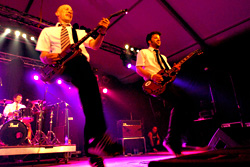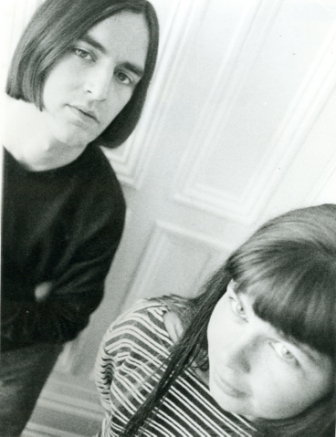In the summer of 1995, even if your life depended on it, you simply couldn’t avoid “Kitty,” “Peaches,” and “Lump,” the three singles released by the venerable Seattle-based rock trio the Presidents of the United States of America. All three were very simple, undemanding rock songs with lyrics that didn’t require much serious thought process or cryptic deciphering (unless you never noticed, or were too young to understand, the female anatomy euphemisms in “Kitty” and “Peaches”). The songs were like a plague on the radio and MTV, transmitting their infectiously catchy and absurd lyrics, hooks, upbeat grooves, and punky musical constructions into our consciousness. You couldn’t get them out of your head. “She’s lump! She’s lump! She’s in my head!”
Yeah, no shit.
The Presidents were already a popular band around Seattle when their self-titled debut was rereleased by Columbia in 1995. But when the aforementioned songs were thrust into the spotlight that summer, Chris Ballew, Dave Dederer (replaced by Andrew McKeag), and Jason Finn—three simple dudes who made up the Presidents of the United States of America—became overnight sensations, amassing a huge, passionate fan base around the globe and ultimately selling over 2 million copies of their debut. A year after releasing their sophomore album, II, in late 1996, the band called it quits, with Ballew going all James Dobson on his fans to focus on the family. Certainly for the fans, the news was hard to swallow.
“I was pretty devastated,” says Mike Lyon, a 28-year-old Minneapolis-based fan who started and operated one of the earliest PUSA appreciation Web sites. “The Presidents meant a lot to me, more than any other band. I felt really lost.”
Sal Garro, a 22-year-old fan from White Plains, N.Y., who started www.chrisballew.net with Lyon and John Quarantillo, was equally crushed. “It was one of the most upsetting moments of my life at that point,” he says.
Although the band was on the back burner, PUSA occasionally released an album (2000’s Freaked Out and Small and 2004’s Love Everybody) and played a show here and there to mend fans’ wounded hearts. When I saw that PUSA were playing three shows on three consecutive nights during Presidents Day weekend at the Showbox, it was a total shock. Even more shocking was that those shows would no doubt sell out. I’ve never been a fan of the band, so I had no idea that PUSA actually did something after 1997. The fact they were still around was news to me. Then I discovered the band’s very active core fan base has preserved the legacy of the band via the Internet (e-mail lists, Web sites, and discussion groups). To me, the Presidents of the United States of America were just a band of the past—a blip on the commercial rock radar. As I came to find out, to the fans I talked to, discovering PUSA was equivalent to an epiphany—the band forever changed their lives.
“My first impression was, finally, some rock music in this sea of angsty, throw-away alt-rock,” says Eric Reiter, a 25-year-old advertising agency administrator from Milwaukee, who has seen the band in concert seven times since 1996.
“It seemed like fun, straightforward rock, which was something of a novelty in 1995,” adds Lyon. “It wasn’t the introspection and morbidity of the early-’90s alternative scene; it was like an introduction to pure, unadulterated rock and roll.”
Lyon, Garro, and Reiter are diehards, or what Quarantillo calls “über-fans,” who have traveled great distances to see the band and its various side projects. Lyon has also seen PUSA seven times and flew to Seattle for their New Year’s reunion show a couple years ago at the Crocodile. “My girlfriend at the time thought I was a little nuts,” he says, “but when it comes to the Presidents, I’m bound to go above and beyond that which is reasonable.”
The 43-year-old Quarantillo (known in the PUSA circle as “the Amazing” Jack Q), from Washington, D.C., has also traveled to Seattle to see the band. Garro traveled from Boston to Princeton University in New Jersey for a reunion show where there were “Jell-O shots and lots of fratty college rowdiness.” Reiter says he felt like he was following the Grateful Dead in the summer of 2004. “I traveled from Milwaukee to Decatur to Chicago and back to Milwaukee, seeing shows in all three cities.”
In addition to traveling and meeting the band backstage, some fans have reached beyond the computer screen. Jay Endsley from Rochester, N.J., flew with his son toRoanoke, Va., two years ago to meet with fellow PUSA Yahoo! Groupers at the band’s show.
Because these hard-core fanatics share a great deal of knowledge about the history of the band, I asked if they could explain to me how a band like the Presidents of the United States of America have maintained such a strong and dedicated fan base over all these years.
“Personally, I think the fan base really solidified after the breakup. People came looking for the “discussion group” so they could talk about this little band that they loved so much,” says Lyon. “We all tried really hard to keep interest [in] Chris and the Presidents alive and kicking, and they were happy to talk with us and fill us in on their activities and really validate the work we were doing.”
“They understand the power of the Internet and the size of the underground fan base,” says Quarantillo. “They are pretty savvy about keeping in touch with the fans through the Internet. Even during the ‘dark days,’ the band has always been in touch with the fans. We kept the spark alive and waited patiently for the triumphant return.”
“On the surface, I think that the songs have great staying power,” says Lyon. “They never seem dated. Even if you haven’t heard them in a while, you can play their records again and get that same feeling you did when you first heard them.”
Listening to their debut album 12 years later, I wish I could say the same.






